15 Best eCommerce CMS for Your Online Businesses
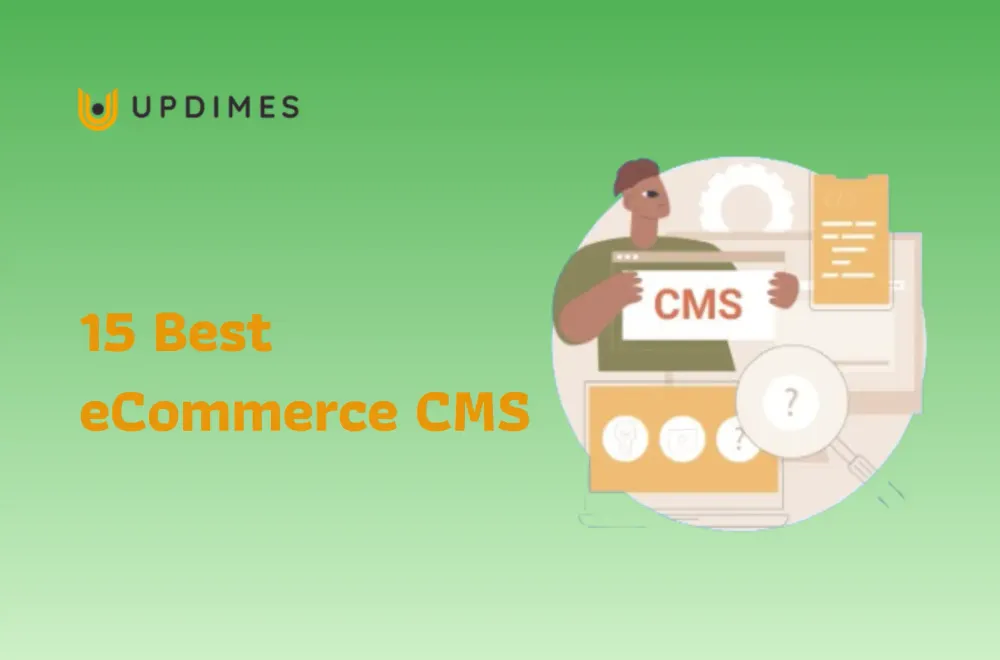
An effective Content Management System (CMS) makes it simple to run an eCommerce store. You may focus on selling your products instead of spending hours on the tedious, technical components of having an internet presence.
Ecommerce CMS platforms enable you to develop and update your online store without coding by using an easy-to-use editor. They're especially common among entrepreneurs who aren't yet tech-savvy enough to create their websites. However, by employing a CMS platform, you may still express your creativity and create your website.
We've compiled a list of the 15 top eCommerce CMS platforms for online enterprises. There is something for all individuals, whether you own a tiny business or an extensive corporation.
What is an eCommerce CMS?
An eCommerce content management system (CMS) enables eCommerce store owners to generate, publish, and modify content on their eCommerce platform without additionally writing any code. CMS for eCommerce promotes web development, making it possible for non-developers to administer eCommerce platforms. You can use an eCommerce CMS to personalize all parts of your online business, including navigation, layout of goods, shopping cart settings, and so on. It enables anyone, regardless of programming skills, to create an eCommerce store that embodies the spirit of their brand and gives customers a satisfying shopping experience.
Benefits of using CMS for Ecommerce
The combination of eCommerce and CMS produces a dynamic result. It has the potential to provide enormous value to business owners while also providing wonderful experiences to customers. When an eCommerce platform is combined with a distinct CMS, it provides various benefits, including:
More visitors
Customers receive greater value when you incorporate content marketing into your eCommerce platform via blogs, case studies, papers, and so on. This enhances their buying experience by making it more informed and pleasurable. Furthermore, quality content improves the SEO of the eCommerce website, resulting in massive organic traffic to the online store.
Scalability
By using a CMS for eCommerce platform, you can effortlessly transform your website into an online store. Assume you wish to monetize your blog, which has a sizable readership. Then, by connecting your site with a content management system (CMS) like BigCommerce, you can add functionalities like a shopping cart as well as checkout to the existing site. This will assist you in converting it into an internet store, via which you can now conduct sales.
Flexibility
Nowadays, an eCommerce store must be extremely adaptable. With so much competition, adopting new trends efficiently and swiftly is critical to increasing sales. As a result, the platform must be adaptable to respond to immediate needs and handle material appropriately. This is easily accomplished when a CMS is integrated with an eCommerce platform.
Seamless UX
You can get creative with content more with a CMS. In comparison to eCommerce platforms, it supports a variety of content types, designs, constraints, and so on. As a result, by improving every step of the client's journey, you could enhance the customer's experience. Clients today aren't struck by clear sales pitches; instead, they'd like to connect with the items. You can accomplish this with eCommerce CMS without hiring a site design agency.
Streamlined processes
You can attain the ideal balance by combining CMS and an eCommerce platform. Whereas content marketing (with the help of a CMS) can generate attention to your online store, an eCommerce platform helps streamline procedures such as inventory management, secure payments, on-time shipment, and so on. Therefore, you can offer your customers a complete bundle.
15 Best eCommerce CMS for Your Online Businesses
#1. Shopify

Shopify is one of the most widely used eCommerce CMS platforms today. It is a cloud-based system that includes everything a business operator needs to quickly and effectively set up an online shopping store
Shopify has a user-friendly interface and various eCommerce features built-in, making it a popular choice among several online eCommerce store owners.
Features:
- Obtain a complimentary SSL certificate
- Get UPS, USPS, and FedEx shipping rates automatically.
- A diverse collection of professional templates and themes.
- Supports sales through multiple channels
- Receive a credit card with a low-interest rate and no extra fees.
Pricing:
- Basic Shopify: $29/month
- Shopify: $79/month
- Advanced Shopify: $299/month
#2. BigCommerce
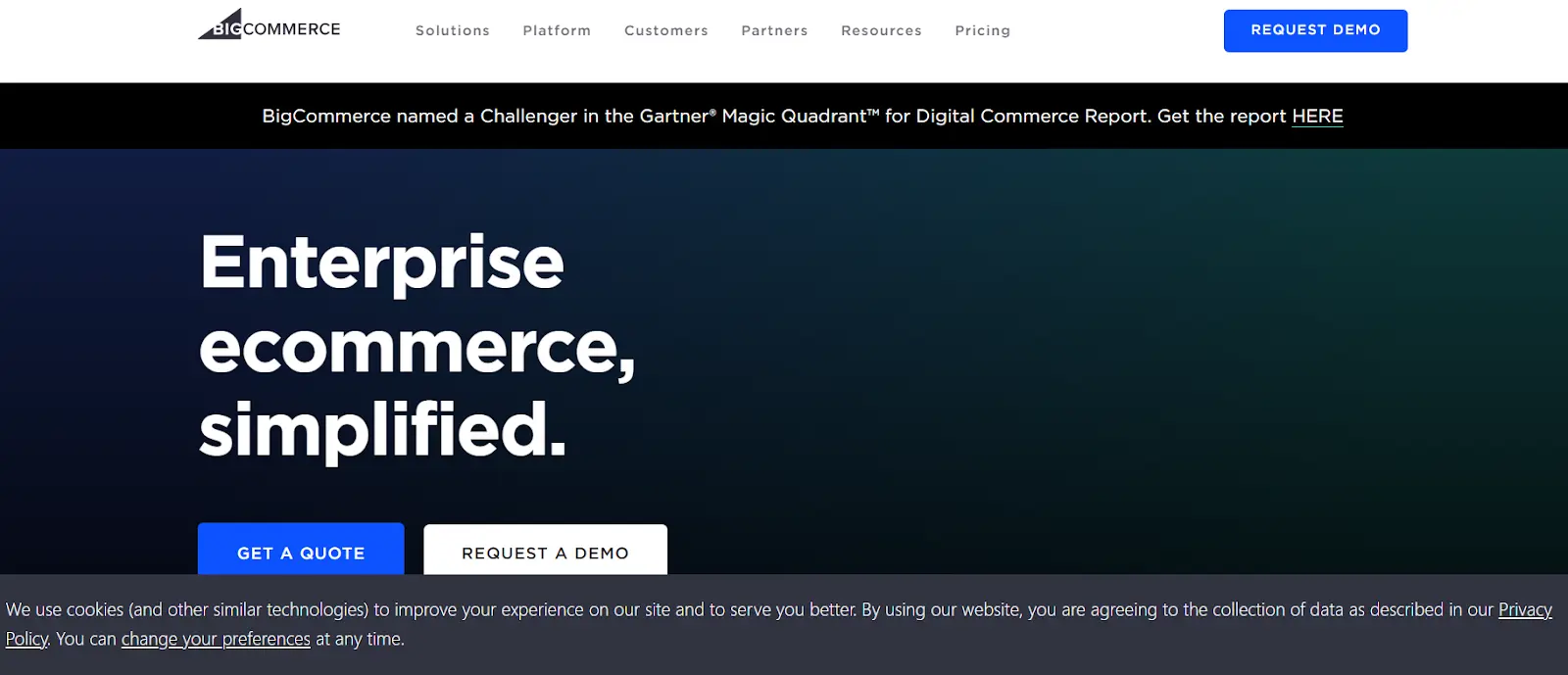
BigCommerce is a SaaS eCommerce system that assists online entrepreneurs in the creation, operation, and maintenance of their websites. It is well-known for acting as the Content Management System for well-known companies such as Toyota, Burrow, and Skullcandy.
Features:
- Differentiate your customers based on pricing, product availability, and promotions.
- There are approximately 320+ free/low-cost add-ons.
- A powerful and versatile website editor.
- Streamline your sales taxes or apply custom tax tables.
Pricing:
- Standard: $29.95/month
- Plus: $79.95/month
- Pro: $299.95/month
- Enterprise: Request
#3. Squarespace Commerce

Squarespace is a website developer and hosting system that provides a built-in eCommerce approach, Squarespace Commerce, for online businesses. Squarespace Commerce is a popular option for small businesses, creators, and creatives wishing to create an online store. There are numerous integration options available to help with payment processing.
Features:
- Squarespace Analytics for tracking website performance
- Built-in tax calculators
- Offers subscription-based selling
- Complete inventory management with stock API, announcements, and inventory panel
Pricing:
- Basic Commerce: $26/ month
- Advanced Commerce: $40/ month
#4. Opencart
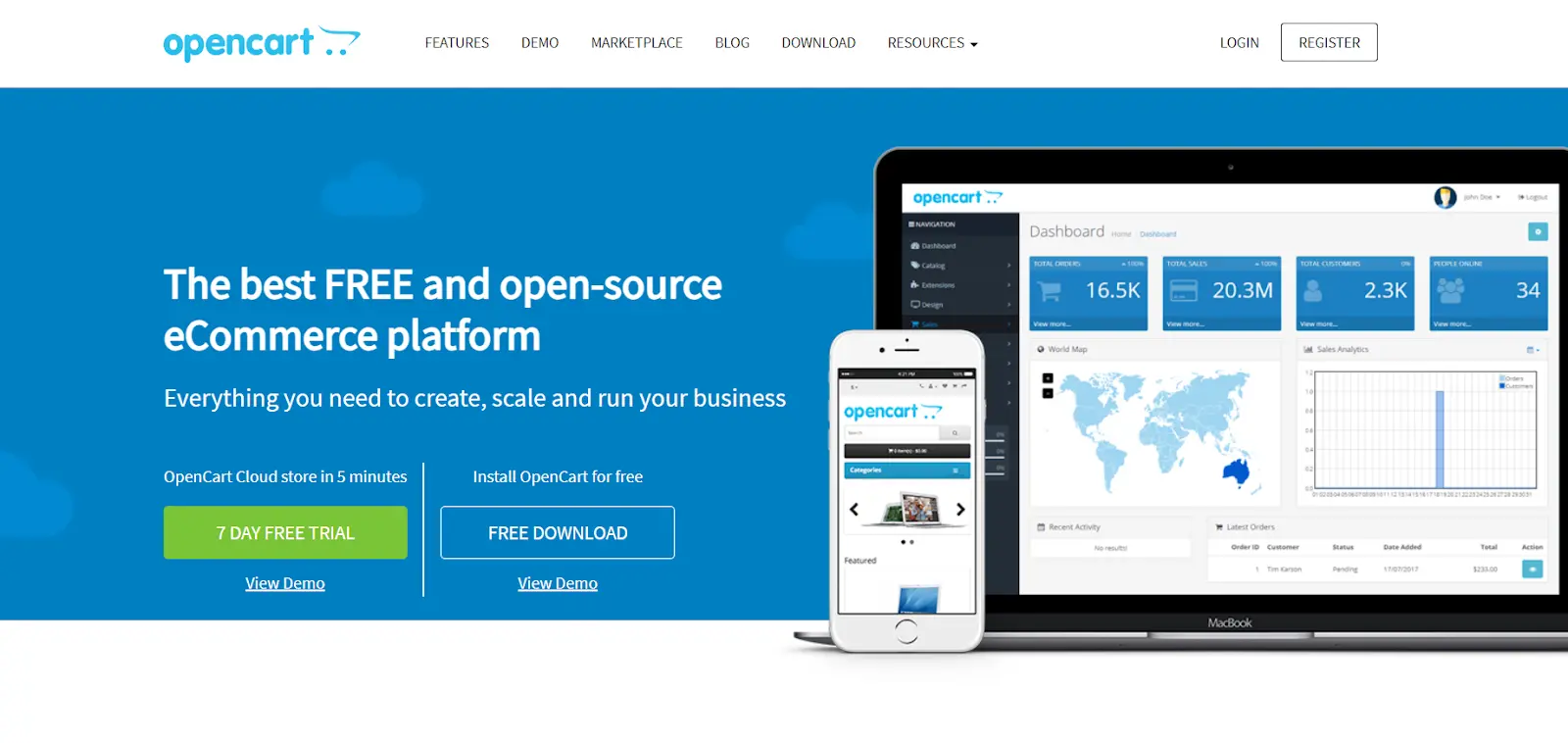
Opencart is an excellent alternative for small businesses because it is inexpensive, feature-rich, and simple to use. It is a free and open-source platform with an optional commercial hosting package called Opencart Cloud. To run an Opencart store, basic technological expertise is required, thus the learning curve is minimal. However, compared to other platforms, it offers a wide range of extensions, themes, and plugins at a minimal cost. It also provides a variety of enterprise services for a fee.
Features:
- The OpenCart marketplace has almost 14,000 extensions accessible.
- Combines easily with a variety of payment gateways
- Multiple shipping methods are supported.
- Analyse customers by location, purchase history, gender, wish list products, and so on.
Pricing:
- The basic features: free.
- Password Reset: $99/ reset
- Dedicated Support: $120/ month
- One-time Store Backup: $160/ backup
- One-time Bug Fix: from $150
#5. WooCommerce
WooCommerce is another well-known CMS platform for creating and administering eCommerce websites. It is an open-source platform based on WordPress, one of the most popular CMS tools for constructing websites.
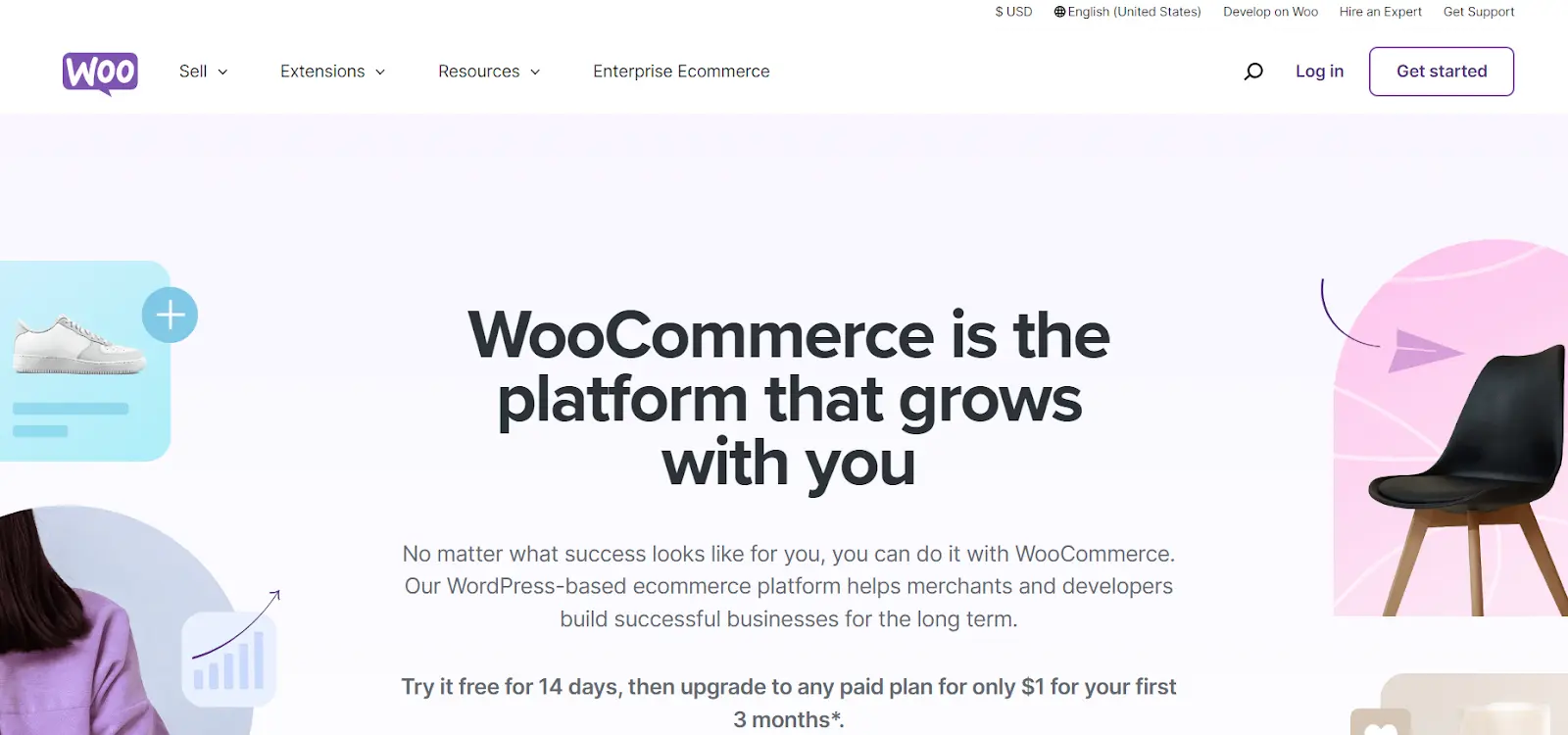
WooCommerce is a robust eCommerce solution that enables customers to develop completely configurable and feature-rich online stores. Whether you are looking to create a new online store or transform an existing site, WooCommerce hosting provides the infrastructure and support needed for a seamless and feature-rich eCommerce experience.
Features:
- Auto-detect customer's place of residence to calculate taxes and simplify shipping.
- Allow your consumers to request refunds with a single click.
- Over 1300 WooCommerce themes
- Has a variety of in-store marketing extensions.
Pricing:
- The core WooCommerce plugin: free
- Add-ons: Begins from $0 to $200
#6. Adobe Commerce (Magento)

Adobe Commerce is another prominent open-source CMS application specifically developed for e-commerce websites. It was first released in 2007 and is currently one of the most extensively used ecommerce CMS platforms in the world.
Features:
- Building websites using drag-and-drop technologies
- It is simple to generate, preview, and organize content.
- Product pages are simple to create and customize.
- A wide range of plugins for CRM, ERP, and chatbot support are available.
Pricing:
- Magento Open Source: Free
- Magento Commerce: $22,000–125,000/year
#7. PrestaShop

PrestaShop is a successful open-source e-commerce platform that debuted in 2007. It is database-driven and written in PHP. PrestaShop provides a wide range of capabilities and features to assist merchants in creating and managing their online stores. We also offer a comprehensive guide of this platform that you can take a look!
Features:
- Simple template editor
- Integrates nicely with social media
- You can include an advertising module to aid with lead generation.
- Select from a variety of payment gateway alternatives.
Pricing:
- Free
#8. Wix

Wix is the ideal option if you have few products and want to rapidly construct an internet store for your business without performing any coding. Wix is primarily a website constructor, but you may utilize it as an eCommerce CMS if you sign up for its Business & Ecommerce Plans. The most appealing qualities of Wix are its convenience and ease of usage. Wix's drag-and-drop editor and ready-to-use templates make it simple to get started. It is also mobile-friendly, ensuring that your eCommerce platform is responsive by default.
Features:
- 500+ designer templates
- Allows for multi-channel selling.
- Wix Owner app for business management on the go
- Integration with social networking and third-party applications
Pricing:
- Business basic: $17/month
- Business unlimited: $25/month
- Business VIP: $35/month
#9. Drupal
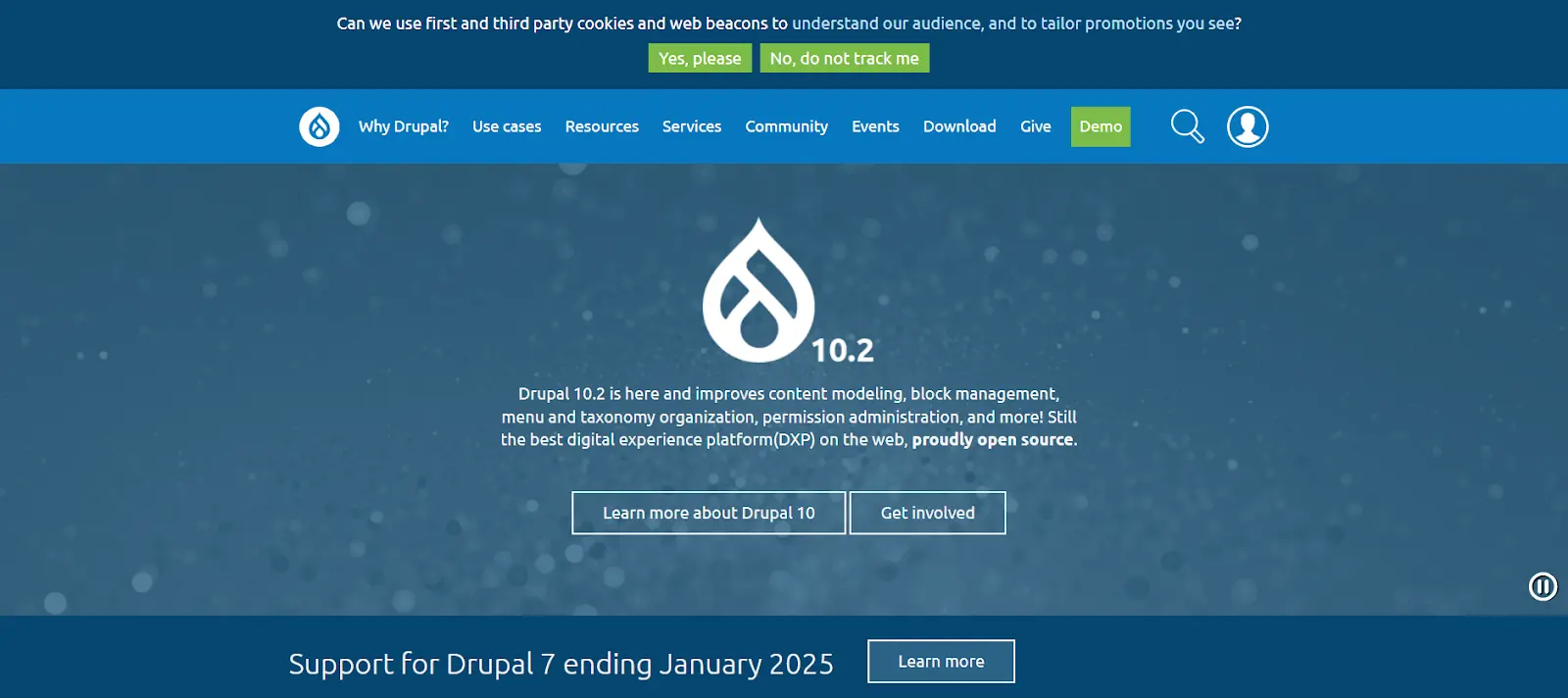
Drupal is an open-source CMS system that allows an ecommerce company to create professional websites from the ground up. Plugins can be used to achieve basic eCommerce functions such as order management, shopping cart, and payment processing. However, because it takes some technical understanding, the platform might be challenging to use for non-programmers.
Features:
- Has an integrated workflow system.
- Highly adaptable and adjustable
- There are numerous excellent solutions for developing mobile websites.
- Allows the use of multiple languages
Pricing:
- Both Drupal as well as Drupal Commerce are free to use.
#10. Weebly eCommerce
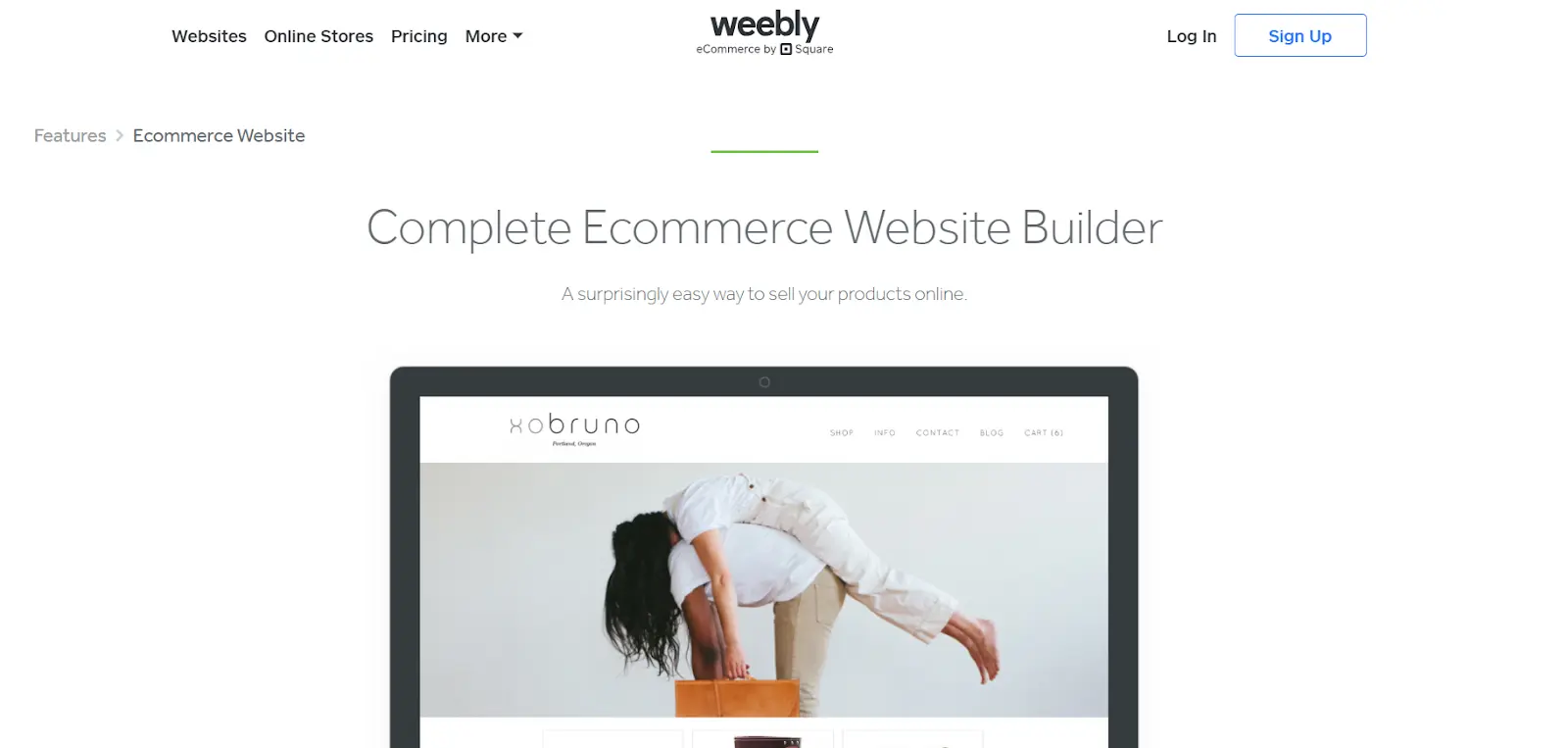
Weebly eCommerce is a website builder platform that enables businesses to rapidly and easily establish a professional eCommerce website. It was started in 2007 and bought by Square in 2018. Weebly eCommerce website builders are a popular choice for small and medium-sized enterprises due to their easy-to-use interface and reasonable pricing.
Features:
- Management of inventory
- Payment Processing
- Tax and shipment administration
- Connection to the Square Point of Sale (POS) system
Pricing:
- Basic use: Free
- Personal: $10 /mo
- Professional: $12 /mo
- Performance: $26 /mo
#11. HubSpot
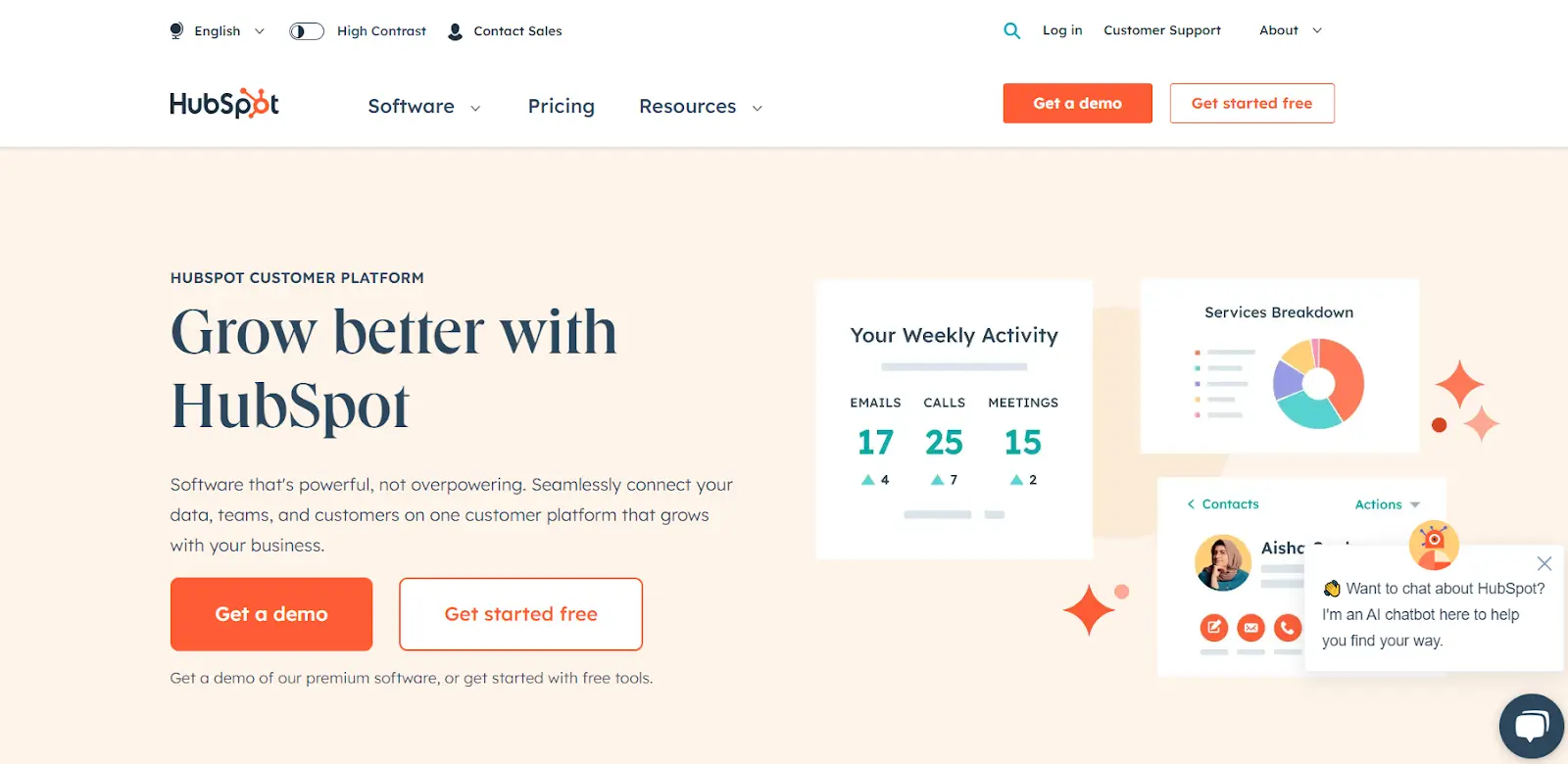
Hubspot is an ideal solution for large eCommerce companies that must place a high priority on marketing and SEO. It is essentially a CMS and marketing automation tool. eCommerce functionality, on the other hand, can be added to Hubspot via integration with other eCommerce-only systems. Hubspot's SEO services and advertising abilities are excellent, resulting in massive traffic to the online store. It also provides sophisticated analysis and tracking tools.
Features:
- Set up customer service in minutes.
- Analytics dashboard to obtain information such as ranking in search engines, user actions, and so on.
- Automate advertising strategies
Pricing:
- Starter: from $25/month
- Professional: from $400/month
- Enterprise: $1,200/month
#12. Volusion

Volusion acts as a cloud-based eCommerce CMS platform designed for small enterprises selling a limited number of items. It was released in 1999 and has remained popular to this day due to the extensive features it provides. It enables SEO-optimized content production by managing metadata, product page headers, category page text, and so on. Volusion is a low-cost solution that supports all fundamental functionality.
Features:
- Has the management of stocks and payment collection tools built-in.
- It is a non-coding platform.
- Encourages the spread of stores to other channels such as Amazon and eBay.
Pricing:
- Personal: $29/month
- Professional: $79/month
- Business: $299/month
#13. Zen Cart
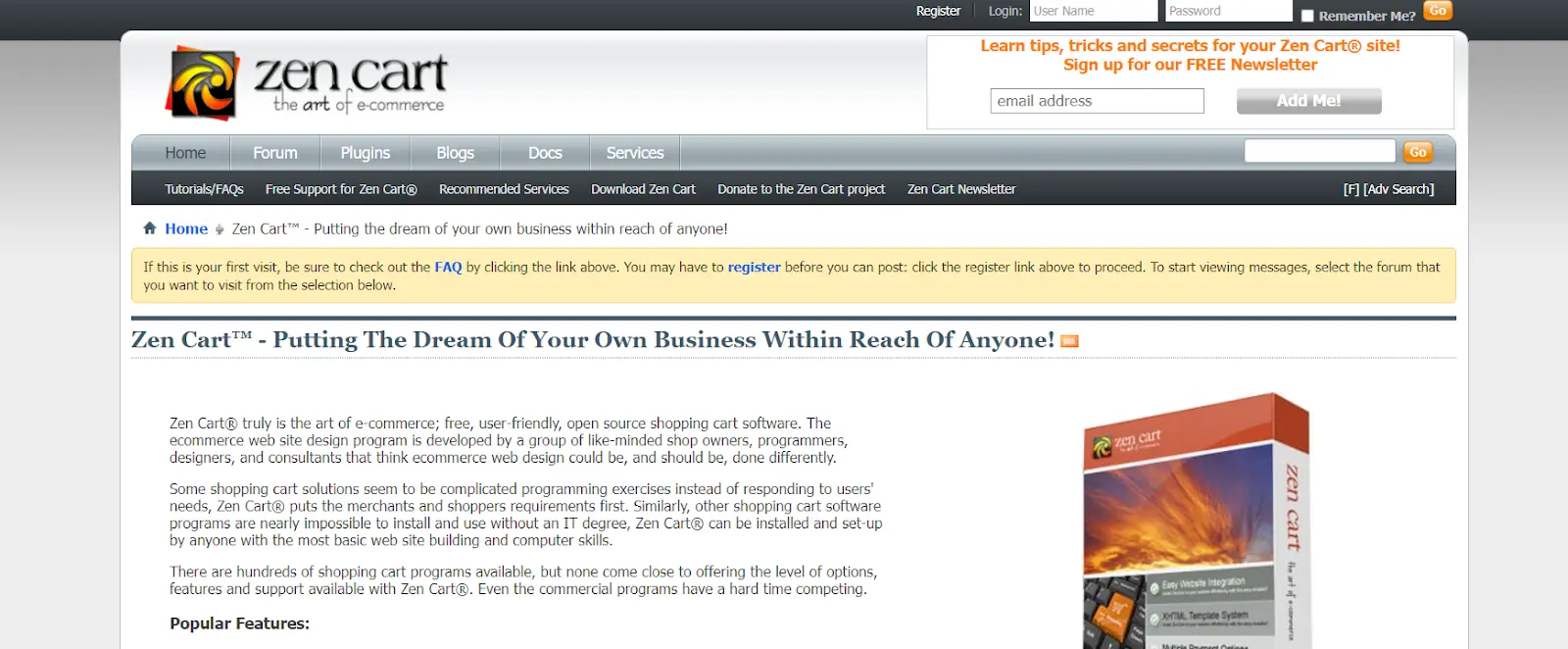
Zen Cart is an entirely free and open-source marketplace software built on osCommerce. It was created in 2003 and has since grown into a powerful ecommerce platform with several features.
Features:
- There are several payment and shipping options available.
- Templates and themes that can be changed
- Order tracking and administration
- Multi-currency and support for multiple languages
Pricing:
- Free
#14. osCommerce
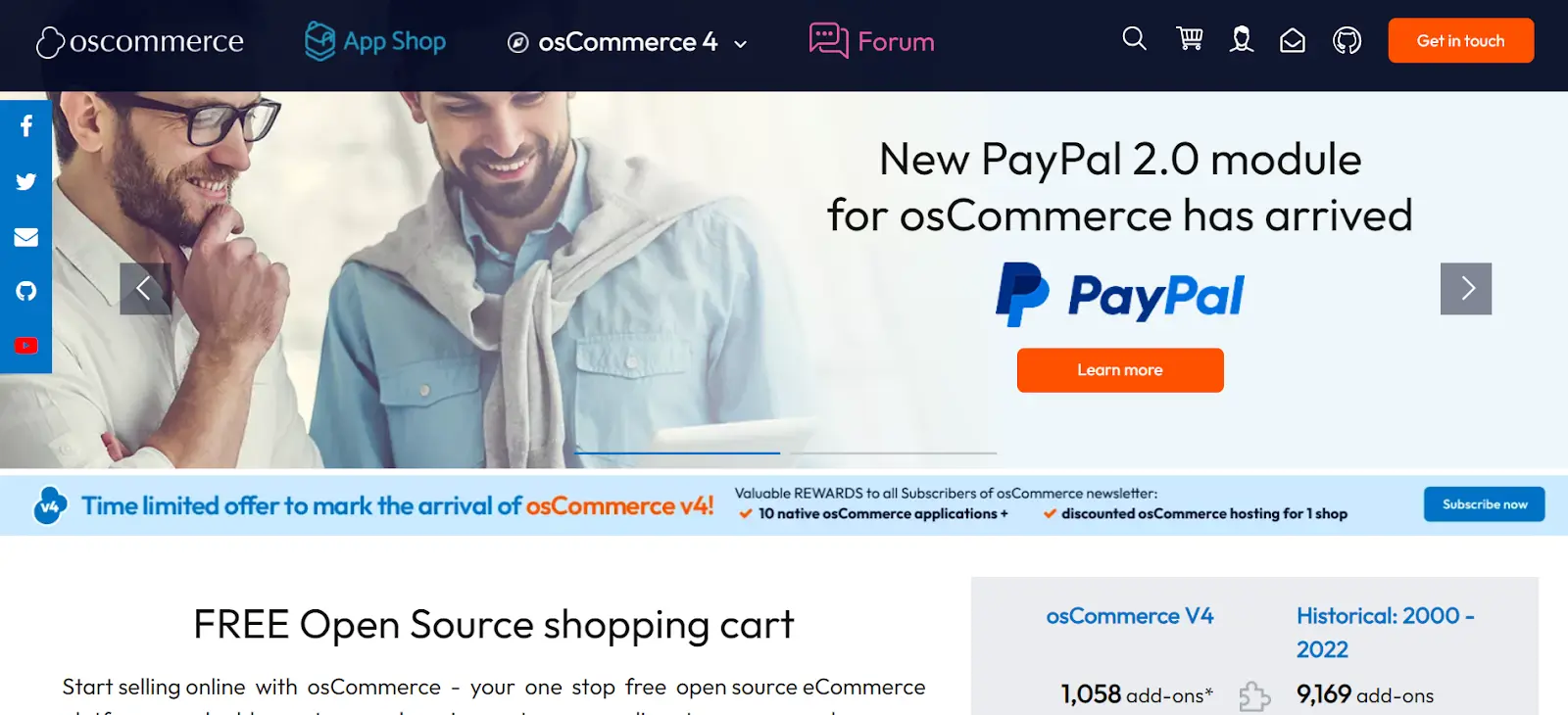
osCommerce, which was initially released in 2000, is a free and open-source eCommerce platform. It has become one of the earliest and most popular e-commerce systems accessible today, with a sizable development and user community.
Features:
- 9166 free add-ons have been posted by community members.
- Enterprise-level osCommerce capabilities are provided for stores with extensive catalogs and high transaction volumes.
- Free and paid assistance is available at all stages.
Pricing:
- Free
#15. Jumpseller

Jumpseller is an eCommerce platform with an appealing design and an easy-to-use interface. It is a cloud-based service that allows you to construct online businesses and sell things all over the world. Jumpseller provides a large selection of free and premium themes.
Features:
- Get shipping quotes from UPS, USPS, and other companies.
- Create digital invoices automatically.
- Add live chat help to your online shopping website.
- Customization options allow you to place your brand's identity and vision on your web-based business.
Pricing:
- Plus: $21/month
- Pro: $42/month
- Premium: $84/month
eCommerce CMS: FAQs
Do you need an eCommerce CMS?
The flexibility of a CMS would assist eCommerce companies that publish fresh content regularly, whether for the blog or as part of the homepage and product page changes. If your store does not require frequent, real-time content updates, you may be able to construct your site without one.
Is a headless CMS suitable for eCommerce?
It is an attractive option for eCommerce websites since it allows for the creation and management of versatile and scalable online stores. Developers can use DatoCMS to produce and manage content for their ecommerce websites without the requirement for a typical, monolithic CMS.
Is Shopify a CRM or a CMS?
Is Shopify a CRM or a CMS? Shopify is a CMS (content management system) designed primarily for eCommerce firms. It is a platform that allows businesses to easily construct an online storefront or marketplace to collect orders digitally.
Conclusion
CMS is a versatile and adaptable framework for creating an eCommerce store. You may easily match your requirements to the above-mentioned eCommerce platforms and choose the best one for establishing your eCommerce web store. All of these eCommerce platforms can assist you in developing a feature-rich eCommerce website!
It's time to launch your ecommerce venture. The first critical step is to select a CMS.


